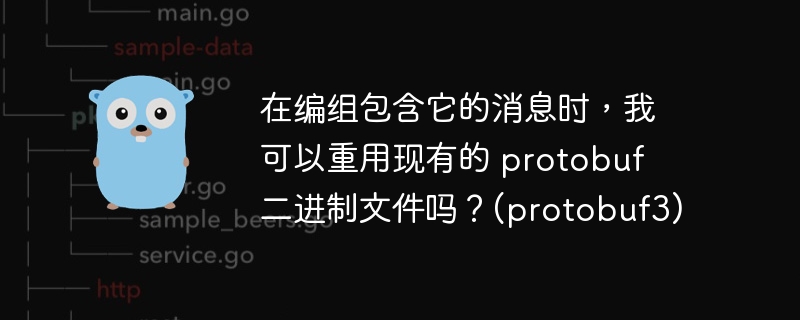
protobuf 定义如下:
syntax = "proto3"
message hugemessage {
// omitted
}
message request {
string name = 1;
hugemessage payload = 2;
}
在一种情况下,我收到了某人发来的 hugemessage,我想用其他字段打包它,然后将该消息传输给其他人。因此,我必须将 hugemessage 二进制文件unmarshal放入go结构中,将其打包到request中,然后再次marshal。由于 hugemessage 的 hgue 大小,unmarshal 和 marshal 的成本难以承受。那么我可以重用 hugemessage 二进制文件而不更改 protobuf 定义吗?
func main() {
// receive it from file or network, not important.
bins, _ := os.ReadFile("hugeMessage.dump")
var message HugeMessage
_ = proto.Unmarshal(bins, &message) // slow
request := Request{
name: "xxxx",
payload: message,
}
requestBinary, _ := proto.Marshal(&request) // slow
// send it.
os.WriteFile("request.dump", requestBinary, 0644)
}
简短的回答是:不,没有简单或标准的方法来实现这一点。
最明显的策略是按照您当前的方式进行操作 - 解组 hugemessage,将其设置为 request,然后再次编组。 golang protobuf api 表面并没有真正提供一种方法来做更多事情 - 这是有充分理由的。
也就是说,有方法可以实现您想要做的事情。但这些不一定安全或可靠,因此您必须权衡该成本与您现在拥有的成本。
避免解组的一种方法是利用消息通常序列化的方式;
message request {
string name = 1;
hugemessage payload = 2;
}..相当于
message request {
string name = 1;
bytes payload = 2;
}.. 其中 payload 包含针对某些 hugemessage 调用 marshal(...) 的结果。
所以,如果我们有以下定义:
syntax = "proto3";
message hugemessage {
bytes field1 = 1;
string field2 = 2;
int64 field3 = 3;
}
message request {
string name = 1;
hugemessage payload = 2;
}
message rawrequest {
string name = 1;
bytes payload = 2;
}以下代码:
req1, err := proto.Marshal(&pb.Request{
Name: "name",
Payload: &pb.HugeMessage{
Field1: []byte{1, 2, 3},
Field2: "test",
Field3: 948414,
},
})
if err != nil {
panic(err)
}
huge, err := proto.Marshal(&pb.HugeMessage{
Field1: []byte{1, 2, 3},
Field2: "test",
Field3: 948414,
})
if err != nil {
panic(err)
}
req2, err := proto.Marshal(&pb.RawRequest{
Name: "name",
Payload: huge,
})
if err != nil {
panic(err)
}
fmt.Printf("equal? %t\n", bytes.Equal(req1, req2))输出 equal? true
这种“怪癖”是否完全可靠尚不清楚,也不能保证它会无限期地继续发挥作用。显然 rawrequest 类型必须完全镜像 request 类型,这并不理想。
另一种选择是以更手动的方式构建消息,即使用 protowire 包 - 再次,随意,建议谨慎。
以上是在编组包含它的消息时,我可以重用现有的 protobuf 二进制文件吗?(protobuf3)的详细内容。更多信息请关注PHP中文网其他相关文章!




